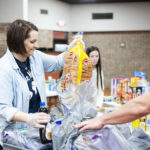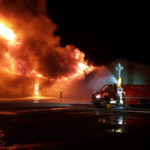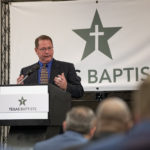WACO—After more than 40 years living and working among the marginalized, Jimmy Dorrell believes wealthy Christians desperately need to learn essential lessons only poor people can teach them.
“I have learned so much from the poor,” said Dorrell, founder of Mission Waco/Mission World and pastor of Church Under the Bridge, a congregation where homeless individuals and people with mental illness worship alongside college and seminary students.
Christian discipleship demands change and growth, he observed. And poor Christians who live humbly, one day at a time without entangling wealth, can teach principles of kingdom living that may escape worshippers in comfortable middle-class churches.
Dorrell takes seriously Jesus’ teaching about how difficult it is for the rich to enter into the kingdom of God.
“Many churches never talk about the danger of wealth. They’re scared to talk about it,” he said.
The church as commonwealth
That concern prompted Dorrell to write Commonwealth: Transformation through Christian Community Development, published by 1845 Books, an imprint of Baylor University Press.
 A commonwealth is a voluntary group organized to strengthen cooperation and advance development by building constructive relationships. That’s a picture of how the church should live in relationship to its community, he asserted.
A commonwealth is a voluntary group organized to strengthen cooperation and advance development by building constructive relationships. That’s a picture of how the church should live in relationship to its community, he asserted.
“God gave us all spiritual gifts, and we’re not all the same,” Dorrell said. “We should see the body of Christ as one commonwealth that benefits from all our different giftedness.”
The church needs some people who have the ability to make money and prosper financially to support the work of God’s kingdom, he said. But wealthy Christians also need to learn what only the poor can teach them, he asserted.
Sign up for our weekly edition and get all our headlines in your inbox on Thursdays
“I’ve been humbled by the homeless guy who gives a dollar to help out another homeless person. I’ve known poor people who are incredibly generous,” he said.
“It’s like the widow’s mite,” he added, referring to the story in the Gospels about how Jesus said the offering of a widow who gave out of her need was greater than the large contributions of those who gave out of abundance.
‘Enter the pain’
Dorrell hopes to see churches move from tokenism—collecting toys for poor children at Christmas or contributing to missions causes from disposable income—to radical generosity rooted in relationships with the poor.
“Too often, we have isolated ourselves from the needs of our cities. The hard realities of poverty don’t hit home,” he said. “We need to enter the pain through incarnational living. That’s what ‘compassion’ really means.”
For Dorrell and his wife Janet, it meant moving to a blighted neighborhood more than four decades ago—an area known for its prostitution, crack houses and crushing poverty. The Dorrells began by building a basketball court next to their home and inviting children and youth from the neighborhood to play there.
Relationships with the young people led to friendships with their parents, and one transformational ministry after another took root in the community under the Mission Waco umbrella.
‘We all need each other’
Before long, Dorrell connected with likeminded believers in the Christian Community Development Association who focus on a holistic gospel and grassroots solutions to neighborhood problems.

“It’s not about showing up in the inner city and saying to the poor, ‘We’re here to fix you,’” Dorrell said. “We all need each other so badly. … We need to listen and learn from each other.”
Churches are good about offering emergency relief in times of crisis, but they often fail to understand the importance of empowering ministries that enable the poor to develop their own solutions to the problems they face daily, he observed.
“Christian community development flips the script,” he said. “It devotes 80 percent of resources to empowerment and 20 percent to relief.”
Both relief and empowerment have their place, he noted. Providing food to hungry people—emergency relief—is part of every worship service at Church Under the Bridge, which currently meets at The Magnolia Market at the Silos while Interstate 35 is under construction.
In fact, even during five weeks when the church could not gather for worship due to the COVID-19 lockdown, food distribution continued as an “essential service” to a vulnerable segment of the community, Dorrell noted.
But Mission Waco also worked with community residents—an example of empowerment—to launch Jubilee Food Market, a sustainable not-for-profit store in a food desert where residents lacked access to healthy and affordable groceries. The original business plan called for the store to reach break-even status in five years; it achieved that goal in three years.
‘I can tell my story’
At age 70, Dorrell has retired from administrative duties at Mission Waco/Mission World, where John Calaway is now president and executive director.
Freed from the day-to-day responsibilities of leading a multi-faceted organization, Dorrell finds more time to minister to his congregation at Church Under the Bridge, work with the Texas Christian Community Development Network and teach others the principles of Christian community development he has learned through personal experience. That’s why he wrote Commonwealth, he said.
“I can tell my story,” he said. “I still have a lot of energy and life left in me. … I can do things that make me feel purposeful. My life is still fun and meaningful.”
The No Need Among You Conference, an annual gathering sponsored by the Texas Christian Community Development Network, will be held as a one-day virtual event on Oct. 15. To register, click here.














We seek to connect God’s story and God’s people around the world. To learn more about God’s story, click here.
Send comments and feedback to Eric Black, our editor. For comments to be published, please specify “letter to the editor.” Maximum length for publication is 300 words.